Col. Sudhir Farm
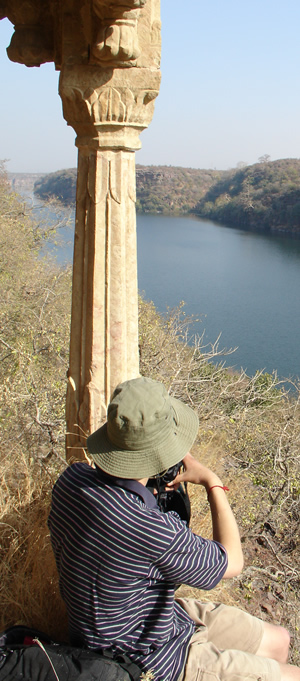
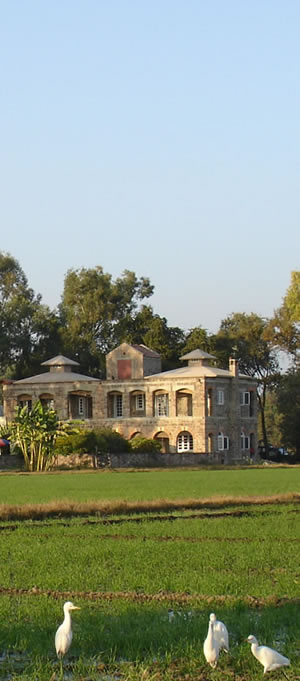
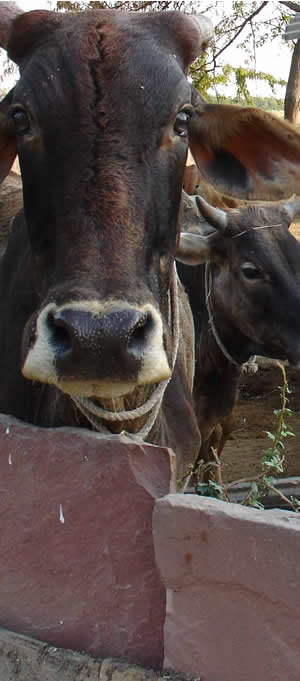
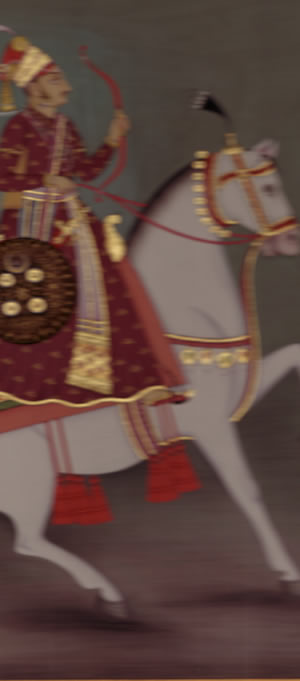
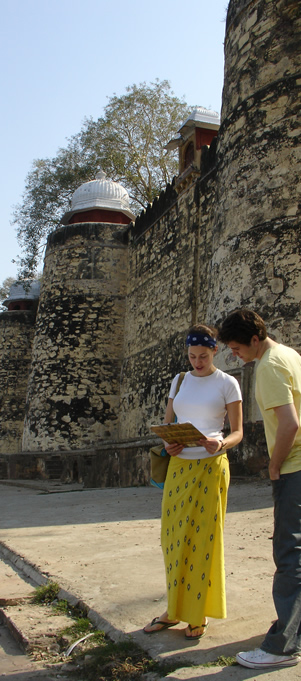
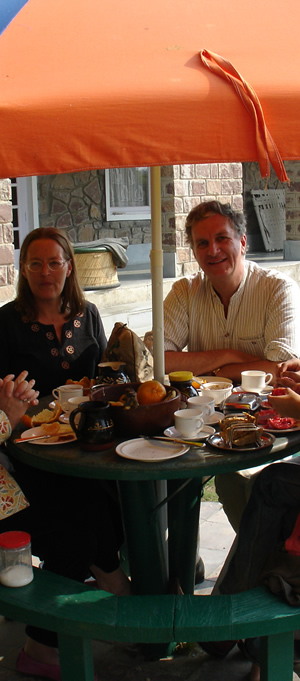
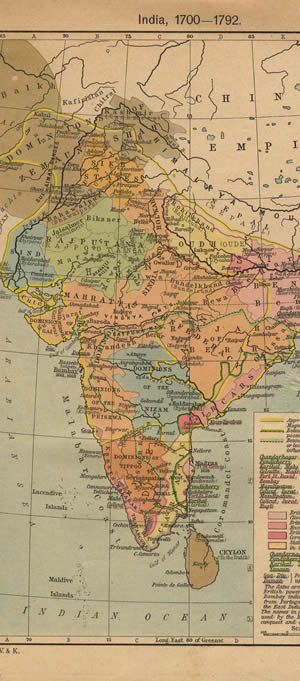
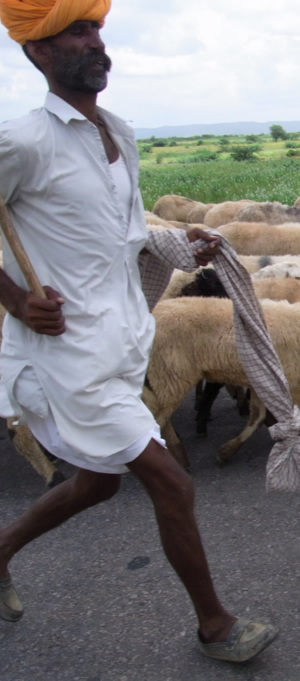
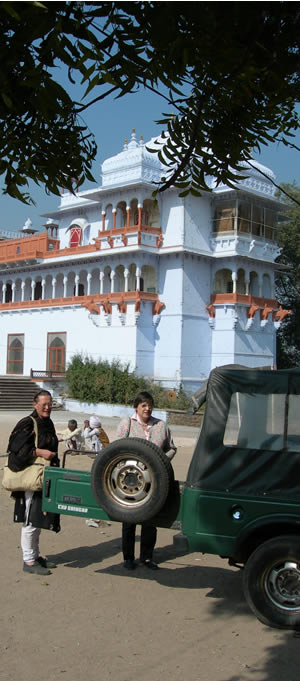
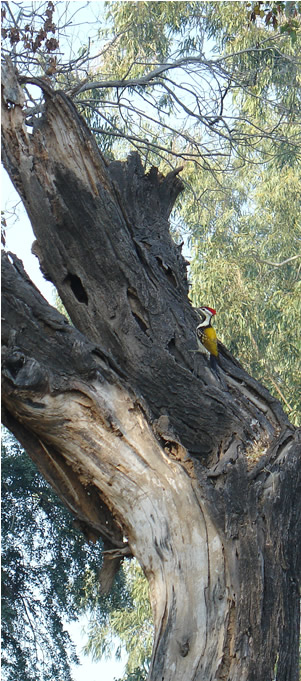
Snippets from the Visitors' Book
The Kota tonga trail was a real highlight - a bit like a 19th Century treasure hunt. It’s full of little nuggets of unusual information and fascinating glimpses into the unsolved mysteries of Kota.
Harriet and Will, London. UK
The memorial to Major Burton and his sons was much more moving than the Taj Mahal or the lake at Udaipur, marvellous as they are.
Henry Vane, Cumbria, UK
...the most comfortable bed I’ve slept in for 2 months....
Charlotte Adam, Winchester UK
Two days out of the noise and the people in a beautiful place. We felt totally
at home
- To be recommended to every person who wishes to experience the Indian country life. We also liked the way the food was prepared...
Patrick & Marie-Christine Lemaigre, Nil-St Vincent, Belgium
We’re only here for the porridge and home made bread! Thank you for a most wonderful time the memories of which we shall carry always. You have given us a wonderful & fascinating introduction to India.
Sue Turner, Lancashire, UK
So ...Rajasthan is not all desert! Thank you for sharing everything with us....
The Read family, London, UK
What a wonderful time we’ve had at the school in the village, at the weavers’, on the river, atop a tonga! Thank you for all your help and contacts throughout India
Anne Gerbner, Philadelphia, USA
It was a wonderful stay and thank you for giving us such a positive look at India and Rajasthan.
Salma Goldstein, New Jersey, USA
- There once was a lady of Kota
- Who took visitors out in her motor
- With the roads and the ruts
- It took quite some guts
- To go out with the lady of Kota.
- But once back at home on the farm
- The world quite descended to calm
- With the plants and the birds
- And fox terriers in herds
- There was balm in the calm on the farm.
Sue Millar, London, UK
After travelling around Rajasthan for two weeks, reaching a real house with books on the shelves, photos on the walls and four happy dogs was simply wonderful.
Camille Savinien, Paris, France
This isn’t tourism. I know of nowhere else where you can experience the real India as well as on your traditional working Rajasthani farm.
Sam Milward, Wellington, New Zealand
Thank you so very much for such a wonderful stay - what a fantastic introduction to India. I don’t think we’ll find such tranquillity elsewhere.
Lizzie Fortune, Hampshire. UK
Fabulous - I’ve been spoilt. It’s hard to leave and face the real world.
Elisabeth Simson, Isle of Wight, UK
After travelling around Rajasthan for two weeks, reaching a real house with books on the shelves, photos on the walls and four happy dogs was simply wonderful.
Camille Savinien, Paris, France
This isn’t tourism. I know of nowhere else where you can experience the real India as well as on your traditional working Rajasthani farm.
Sam Milward, Wellington, New Zealand
Thank you so very much for such a wonderful stay - what a fantastic introduction to India. I don’t think we’ll find such tranquillity elsewhere.
Lizzie Fortune, Hampshire. UK
Our visit at the farm was truly wonderful, off the beaten track it is a slice of India a visitor does not normally experience. Victoria is very knowledgeable about Indian culture and the people - an added perspective for us. The food here was very delicious: organically home grown ingredients, vegetables, fruits, grains prepared simply homestyle. A nice change from curries. Enjoyed the early morning boat ride and walk to the weavers. Many thanks.
Johanna Janssens, Washington, USA
I loved staying with you and the dogs and playing with the toys.
Jonas aged 8, Switzerland
A very welcome break from the crazy world of India – wonderful house, food and hospitality. Thank you so much.
Katie Buxton, Bath, UK
I loved seeing the crocodiles, and I learned a lot about deticking the puppies. Coming to the farm was a great experience.
Stella Bartholet, Washington, USA
A wonderful eye opening visit in every sense. We will be back! Thank you!
Christopher & Joanna Hobson, Northamptonshire, UK
A blissfully peaceful stay. We enjoyed everything – even the power cut. Thank you for lovely food, good company and very interesting trips.
Vicky Stark, London, UK
Exactly what we hoped for and more, bits of India off the tourist track, life as it actually is in villages, teeming life and livestock and the magic of the river.
Sir Hilary Miller, Worcester, UK
Thank you for the introduction to miniature painters, wall paintings, stories, great food, good company, walk through the fields. I loved the paintings in the City Palace and go back full of inspiration and memories.
Nan Mulder, Edinburgh, UK

On the Farm - 2022 Archive
On the Farm - December ’23
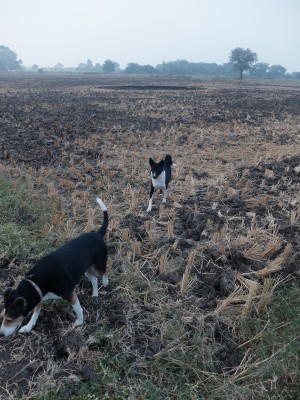
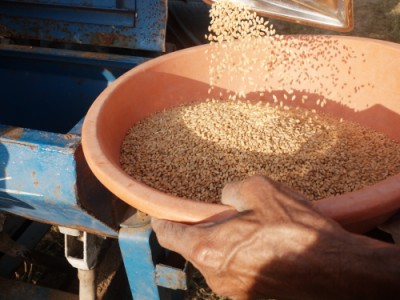
Heavy rain at the end of November and more at the beginning of December meant that we didn’t have to pre-irrigate the wheat fields and could sow once they had dried to the right degree of moisture - baa aagayi. This wintry photograph shows the wet soil and the ploughed-in remains of the rice stubble. We had nearly 41/2 cms. Timely watering speeded up the sowing by nearly two weeks. We sowed our organic deshi wheat C360 and a second heirloom variety we had grown in the vegetable garden last winter to collect more seed, called bansi. The seed drill was emptied before the commercial wheat variety 4037 was filled. All wheat had been sown by December 13th. Newly sown wheat always attracts wild pigs.

Another two year old calf was failing to thrive and had attracted a lot of ticks. The vet recommended a spray of toxic medicine but we decided to make up a spray using Vicks to drive the ticks away. There was some improvement but the cold and the damp got to her and she died in the night on 3rd December.

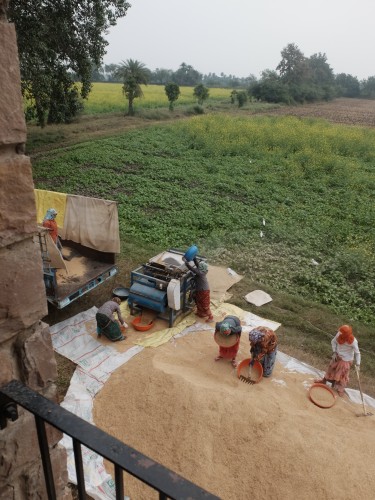
We had stored the rice next to the house and covered it with black plastic "tarpaulins" against the rain. We called the women on 5th December to winnow and load the trolleys with the rice. In the background you can see the tall flowering mustard that had been sown first and the small green plants that had been sown that had been broadcast in the gaps at first watering. The rice sold for a good price of Rs. 3800 for one quintal (100 kgs.). No doubt something to do with a national election coming cup.

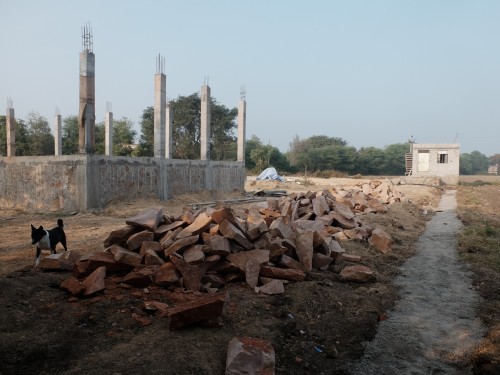
By 12th December the night temperature was down to 12oC and by 20th December it was 10oC. Construction work was going on at the far end of the farm on land belonging to Vijay’s sister Sadhana. She is the proprietor of Hadoti Gas, which is a LNG cylinder dealership and they have been ordered to move their warehouse to a more rural location since the original warehouse is now surrounded by residential and commercial property which has come up over the last forty years. There will be a warehouse on a very high plinth in case of flooding, a chaukidar’s house and high boundary walls enclosing the warehouse. Every day we can see the progress when walking the dogs.
There is construction in numerous places near us which adds to the human interference that has driven the sarus cranes away. On 9th December we heard three sarus and saw them fly over. I doubt they will stay long with the Kaithoon by-pass being built through their traditional wetland breeding ground. The Garbage Transfer Station we had been objecting to has progressed seamlessly under the new BJP state government which was announced on 5th December, so uniparty governance it seems.

The state government changed from Congress to BJP but no chief minister was declared until 11th December. Modi appeared to be wanting to guide the leadership of Rajasthan and placate all castes with an eye on the national elections in the offing early next year. Negotiations shuttled between Delhi and Jaipur and finally the name of a complete unknown first time MLA was announced. Bhajanlal Sharma is a very new broom. He has two deputies so three major castes placated. The cabinet had not been announced by the end of December.

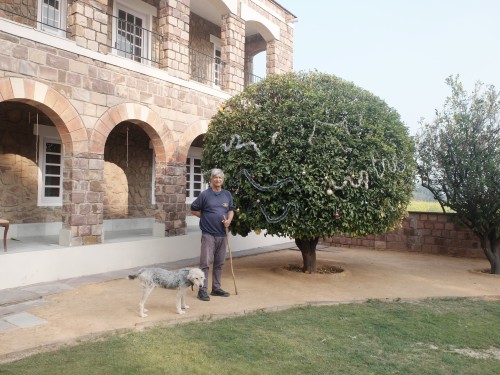 Tigger seen here with eco-friendly Christmas Tree complete with its own golden balls (fruit).
Tigger seen here with eco-friendly Christmas Tree complete with its own golden balls (fruit).
Tigger, our 14-year old German shepherd/fox terrier cross is now feeling very old and had been refusing to eat. He’d had a 20-day course of anti-biotics and was gradually recovering from that heavy medication. His arthritis was so bad he needed lifting up in the mornings before he could get going. Then I realised he could eat liver and so he was given fried goat liver every morning until he was strong enough to eat chicken in the evening. He was constipated and the vet suggested sorbiline made up to 20ml and given twice a day for five days and then de-worming. The laxative sorted him out and he started to eat with more enthusiasm. He walked around the farm on most evenings in December but very slowly and painfully and with his head low like an old wolf. By the end of the month he had still not barked since late November but was generally perkier.
When I took Tigger out at night for his final pee we would walk round the end of the house and hear a warning snort as a wild sow ran back into the mustard warning her three little piglets. As we played our annual new year’s scrabble game in front of a blazing log fire, we could see the sow suckling her young within 10 yards of the house!
Happy New Year!

On the Farm - November ’23
November is rice harvesting month and although full stubble burning is very rare, the last remnants of the straw known as pral is usually burnt and the air is noticeably smoky. And then the Diwali fireworks add to the smoke and in big cities such as Delhi, air pollution is very bad at this time and sadly Mumbai has caught up despite the sea breezes.

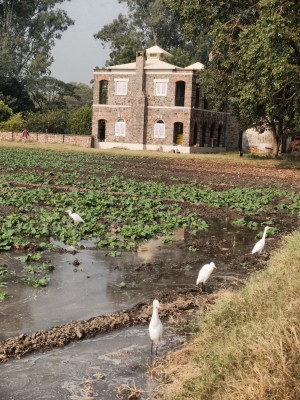
We started by watering the mustard. This has to be done carefully during the day under supervision as too much water will cause the young plants to die. At night the bare fields being prepared for wheat were flood irrigated.

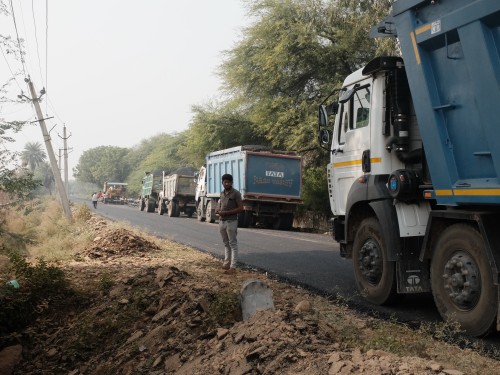
On 3rd November the lorries of ready made tarmac finally reached our section of the municipal road and the road was fully tarmaced. The previous tarmac had been stripped and dumped along the sides and has not been cleared.

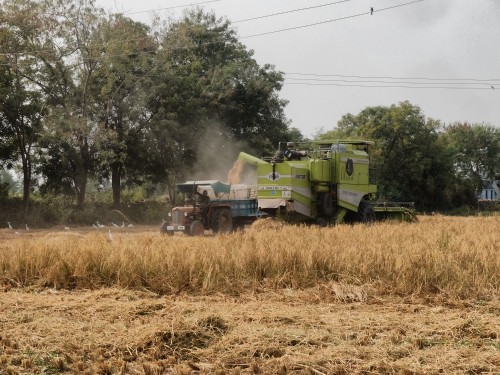
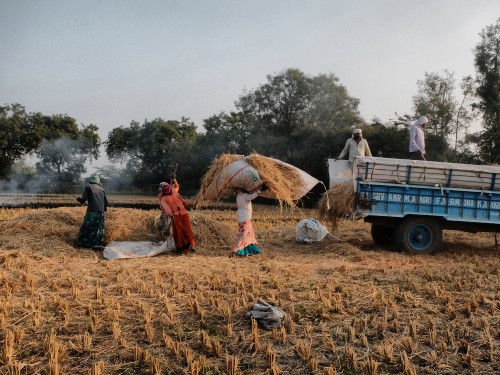
On 5th November the combine harvester arrived to harvest the 33 bighas of rice. Here you can see the rice grain being spewed out into the trolley. By the evening of the 6th it left. The rice straw was left scattered over the fields and we sold it for fodder. Two trolleys were loaded daily and taken off the farm by the buyer. Our pral from our hand cut rice was picked up by the women and trundled to the the cow shed by tractor-trolley.

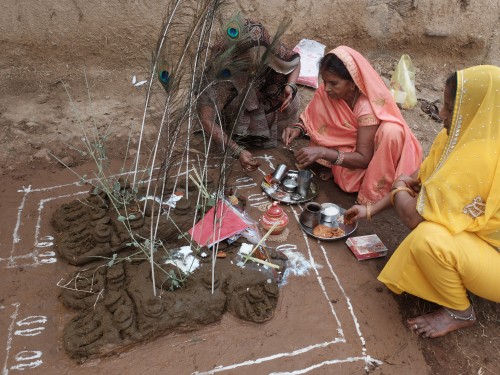
12th November was Diwali, and Govardhan Pooja is usually the next day, but for some reason there was a blank day in between this year and so it was on the 14th. Here the three women are preparing the gobar images of Krishna and his brother Balram, and preparing the details.

The rice which had been combine harvested on the 6th was spread out to dry on the 13th and provided a feast for a flock of pigeons for days afterwards. The rest of the rice was hand cut so the women cut it and after drying in bundles it was piled up in heaps for threshing which began on the 17th. After threshing, the pral was lifted in 7 trolley loads and dumped at the cowshed (photo above).

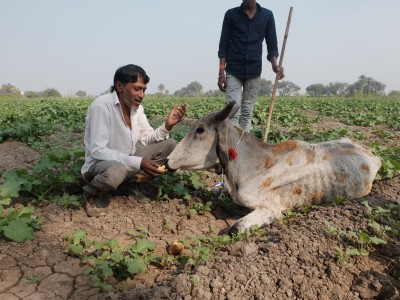
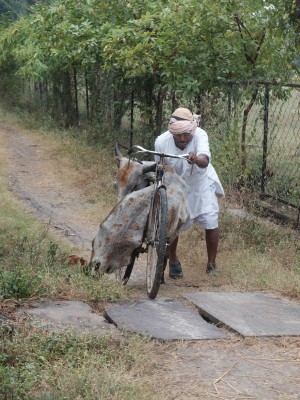
A 6 year old cow Anju, had been suffering from a dislocated front leg since soon after birth and she had never grown and developed as normal and her head looked out of proportion to her body. After so many years of pain and grief she decided to fade away quietly by settling in a mustard field. Here she is being tempted with gur to give her energy to walk back to the cowshed and shelter. That was the 17th. She limped on until 28th morning when she was found dead in the bara. She had been on her side for the previous three days refusing food and water. She slipped away quietly surrounded by her mother and younger siblings and it was just as well as 28th turned into a wet day with 2.07 cms. of rain. Here she is leaving the farm for the first and last time on Rodu’s bicycle. Rodu asked for Rs. 1000 to take her away. That is three days wages for our men who wouldn’t do it themselves.

25th November was election day to elect a new government in our state of Rajasthan, and you will hear the surprise result next month....

On the Farm - October ’23
For those of you who had an unusually wet October you will be pleased to hear that we had no rain at all. The temperature began to cool down and a minimum of 21oC at night had become 17oC by the end of the month.
The germination of the mustard had been patchy and in the Tonk region to the north farmers had to re-sow or plough the mustard in and plant wheat. We started to water our mustard from 21st and scattered more seed in the bare patches. It will eventually catch up by harvest time in March.

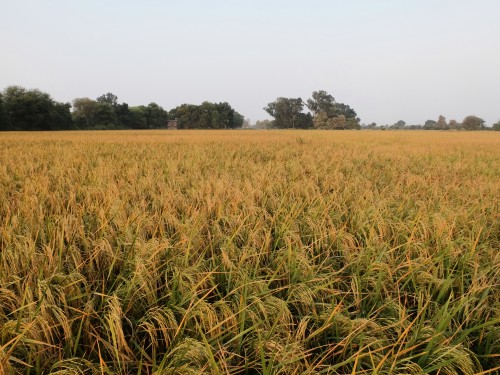
We continued to water the rice at night and the mustard during the day as it can easily be over watered. The rice had its last watering by the middle of the month and the weight of the grain was starting to cause it to fall over. Sometimes it is difficult to distinguish between nilgai and pig damage and heavy seed heads being the cause.

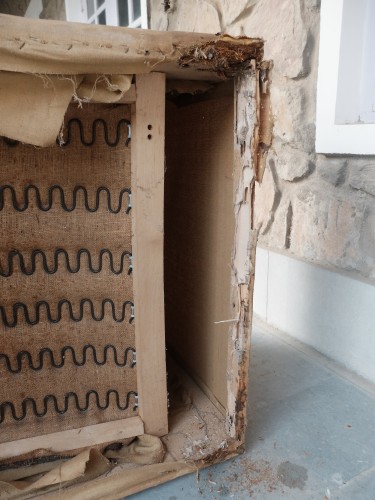
Our termite battle continued. The room that had had the wooden door jamb and drawers stripped out of it was decorated while Vijay was away in Scotland gliding at the Deeside Gliding Club and spending time with our grandchildren on Glen Tanar Estate. The termites were found to have been coming up through the drawing room floor as well and nibbling the wooden structure of one of our comfortable armchairs. It is now on the south verandah for Doosra (one of our dogs).

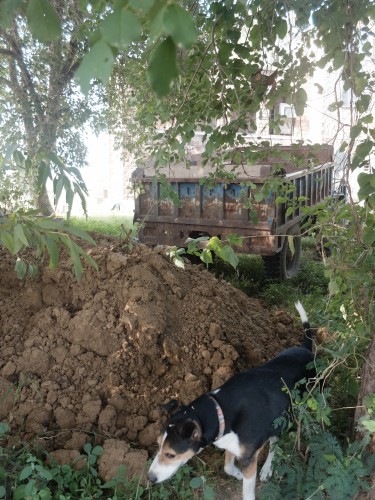
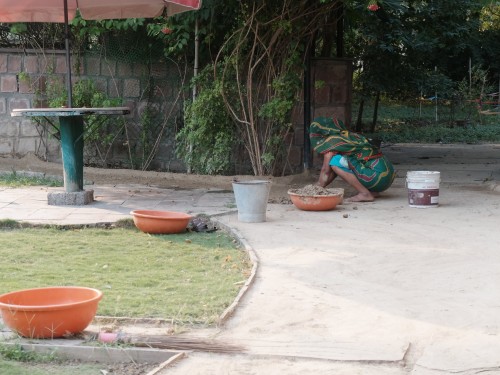
As the monsoon was over we bought a trolley load of peeli mitti, which means yellow soil and is mixed with gobar (cow manure) to form the leepna which we spread on our paths. Shyam, wife of the man who looks after our cows, laid the new coating each evening after returning from work.

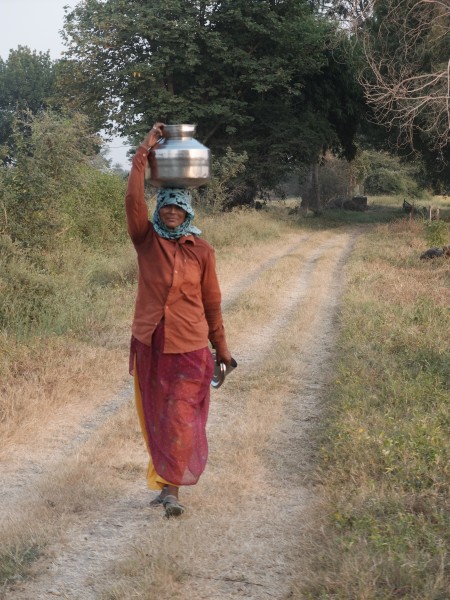
The women arrived on 31st October to start hand cutting the rice. Here clean drinking water is brought straight from our well for the team. Clean drinking water is essential to life and as I write this the people of Gaza are deliberately being denied water, food, electricity, fuel and basic human necessities in full view of the world. India’s policy is to support Israel in its fight against terrorists and while the Global South is united in sharing its anger about the situation, India is unusually quiet and disengaged.

A main issue of concern in October was our oldest dog Tigger’s health. He had stopped eating and was getting weaker and weaker. The new competent private vet, as opposed to the free government vets we had consulted before, tested Tigger’s blood and heart including an ECG and was able to tell us that Tigger had tick fever, anaemia, low platelets, cataracts and arthritis, but the best set of teeth for a 14 year old he had seen in a long time. He was on antibiotics for over 20 days and with a diet of meat and cream he recovered and started being vocal again. When Vijay was in Scotland however, the other two dogs sensed an opportunity and attacked him by the throat. That put him back and made him vomit with anxiety. He had to be accompanied when outside and needed help getting up for a couple of days. The worry is what will happen when he can no longer get up and walk outside.

The Rajasthan state elections are coming up on November 25th and the police are stopping and searching vehicles at check points looking for cash and alcohol used to bribe the voters. I was stopped and had to get out while my Honda Brio was searched. Now they recognise me and wave.

And as for Bardhi Bai, it seems that she will have to get her Aadhar card changed so that her father’s name appears on it and not her son’s. This may be possible in the local e-Mitra (electronic friend) or she may have to take time off and go to Kota’s Aadhar regional office. I will wait until after Diwali to tell her.

On the Farm - September ’23
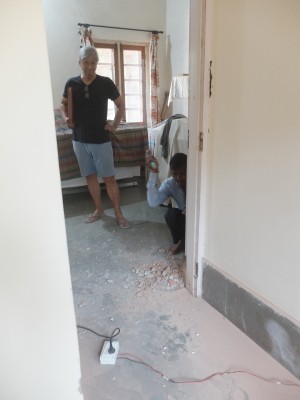
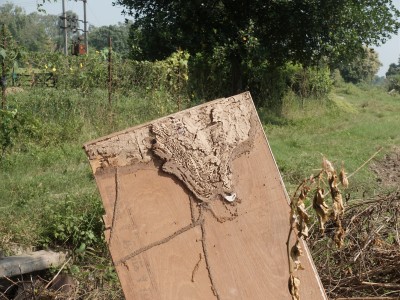
September was a month of termites and mustard. We had waited until after the worst of the monsoon before tackling the termite problem. The first stage was to take out the wooden door jamb and replace it with a stone one. The plywood cupboards were removed and all wooden strips and pegs. The fitted desk and drawers were ripped out and the amazing amount of contents within stored in plastic tubs.
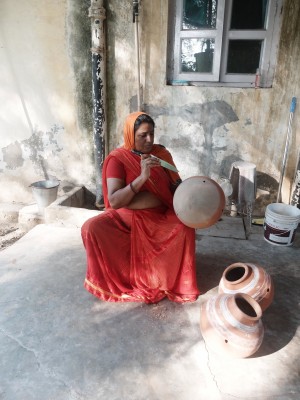
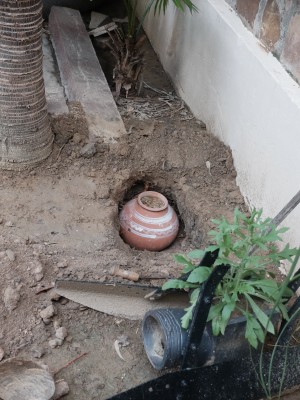
One method of tackling termites we had heard about was to capture the queen and then dispose of it. We decided to try it out. Three matkas were bought and holes made in them (using my best French sabatier knife I notice!). Sugna, our maid, comes from a family of potters and was confident that she could make small round holes in matkas and she did it. The matkas were then filled with cotton seed cake (which we feed to our cows) and buried. The theory is that the queen will take up residence within a month and the whole colony can be removed. We will see.

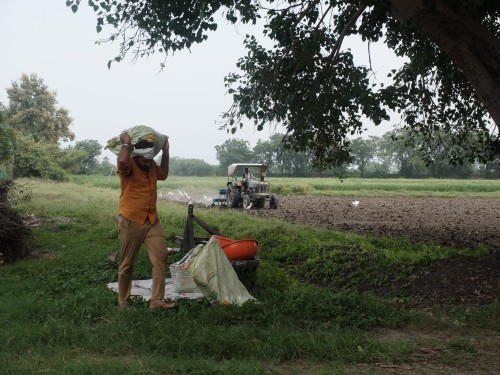 There had been very little rain in August but it did rain on 12 days in September and soaked the ground enough to sow the mustard. We bought Pioneer hybrid seed this year at Rs.800/kg. By the end of the month approximately 29 bighas had been sown with mustard. The submersible pumps were running continuously to water the rice.
There had been very little rain in August but it did rain on 12 days in September and soaked the ground enough to sow the mustard. We bought Pioneer hybrid seed this year at Rs.800/kg. By the end of the month approximately 29 bighas had been sown with mustard. The submersible pumps were running continuously to water the rice.

Kota’s bid for fame is a massive Riverfront Project which had cost over Rs.1400 crores and which involved building 26 different styles of ghats and replicas of the Red Fort in Delhi amongst other buildings on both sides of the River Chambal downstream of the barrage for over three kilometers. There are legal questions hanging over its existence so the Chief Minister avoided coming to the grand opening and it was inaugurated in the rain on 12th September. A week later 13 gates of the barrage had to be opened because of heavy rain further upstream and some of the facing stones were washed away as the project facade disappeared under water. Access to the riverside is said to cost Rs.200 a head and booking has to be online. A maximum of 5000 a day are allowed free registration - probably until after the elections on 25th November.
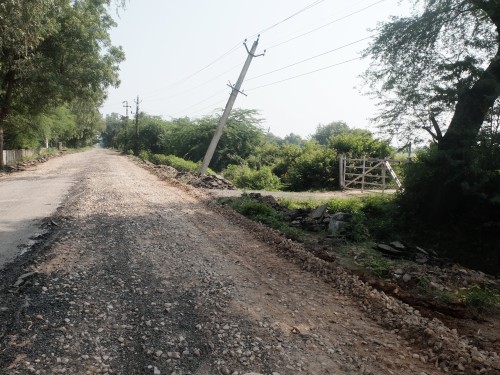 Another long term project that began in September was the re-surfacing of our tarmac road and the concretisation of the section through Umedganj village, separating us from our usual access to the canal road.
Another long term project that began in September was the re-surfacing of our tarmac road and the concretisation of the section through Umedganj village, separating us from our usual access to the canal road.
On 19th September a JCB started destroying the current surface and dumping it along the sides. It is not clear if this surface material will be removed.
The Riverfront Project and electoral freebies have to be financed and one major source of income for the state government is duty on petrol. The other is tax on alcohol. Around 14th September the petrol pumps went on strike for three days over the high taxes on oil products in Rajasthan. Only when I went to Gujarat did I find that petrol costs Rs.96/litre there and in Harayan it is even cheaper. In Rajasthan it is Rs. 108/litre so trucks drive through Rajasthan without refuelling, not surprisingly, and the petroleum dealers are upset.

Tigger, the oldest of our three dogs was getting weaker and weaker and refused to eat. He did not have the energy to wag his tail or bark but walked a short distance around the farm. He is heading for his 14th in October.

The Bardhi Bai saga continues with officialdom having found yet another area of confusion to exploit. She states the name of her father on forms when requested but lives with her son who is a different person. Forms never ask for son’s name, only father and husband’s. She is an elderly widow and of course she lives with her son! Each month we hope for a resolution and for her Provident Fund money to be paid to her and each time they come up with something else....

On the Farm - August ’23
The main story for August was the lack of rain. Less than 3 cms. fell in the entire month with rain being recorded on the farm on only seven different days. This was said to be the driest August since 1905. The worst drought had been in 1899 when only 15" or 33 cms. had fallen in the entire year with 7" or 15.4 cms. falling on 8th July, 1899 and "thereafter not one drop of rain fell". The fields were too dry to sow and much of the grain that was harvested was whisked away on the new railway line. In 1905 there was another drought and the unemployed and needy were put to work on the Nagda-Mathura and Kotah-Baran railway routes. None of the regular droughts were ascribed to man made climatic change!
The agricultural potential of this area has been improved dramatically by the barrage across the River Chambal and a network of main canals and minors across a large ‘Command Area’. Good rainfall in the Chambal’s catchment area in Madhya Pradesh means that the canal could run in August so the farmers could irrigate their soya bean and the ground was recharged so rice farmers could continue to pump ground water day and night.

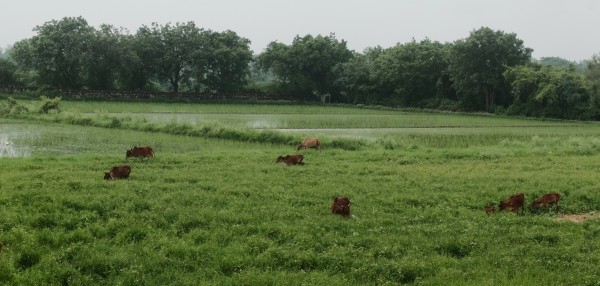 At the beginning of August we were experiencing a normal monsoon and the cows could enjoy grazing in this field of grass and urad grown for green manuring. You can see the young rice in the fields beyond.
At the beginning of August we were experiencing a normal monsoon and the cows could enjoy grazing in this field of grass and urad grown for green manuring. You can see the young rice in the fields beyond.

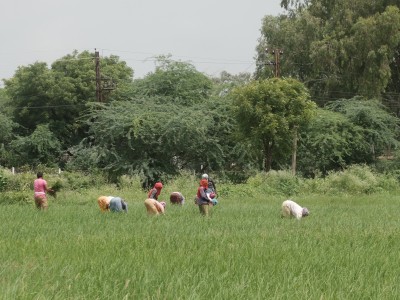 A team of eleven women came for 81/2 consecutive days and hand weeded the rice. They earned Rs. 250 a day for about 51/2 hours work plus an hour for lunch which they brought with them. They would arrive before 10.00am having walked 1.5 km. from the village and would change from saris into clothes they could weed in.
A team of eleven women came for 81/2 consecutive days and hand weeded the rice. They earned Rs. 250 a day for about 51/2 hours work plus an hour for lunch which they brought with them. They would arrive before 10.00am having walked 1.5 km. from the village and would change from saris into clothes they could weed in.
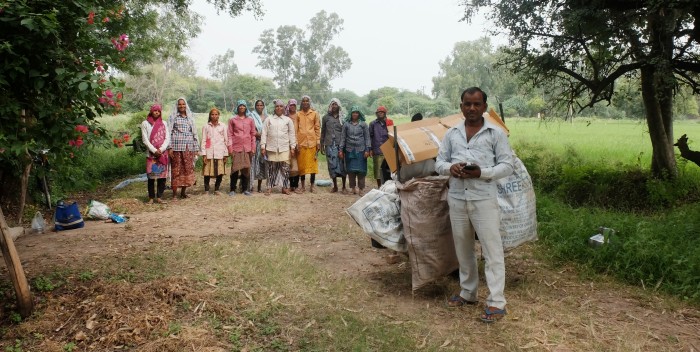 On 7th August an unknown kabari wallah named Lala appeared and we sold 35 kgs. of newspaper to him at Rs. 10/kg. He took most of our plastic but refused the glass bottles. This is a sorry state of affairs when glass cannot be recycled as it is much easier to make new glass. I don’t know what to do with our glass bottle collection. I wonder what happens to all the glass bottles thrown into bottle banks in Europe and the UK? The eleven women weeders line up very nicely for this photograph.
On 7th August an unknown kabari wallah named Lala appeared and we sold 35 kgs. of newspaper to him at Rs. 10/kg. He took most of our plastic but refused the glass bottles. This is a sorry state of affairs when glass cannot be recycled as it is much easier to make new glass. I don’t know what to do with our glass bottle collection. I wonder what happens to all the glass bottles thrown into bottle banks in Europe and the UK? The eleven women weeders line up very nicely for this photograph.
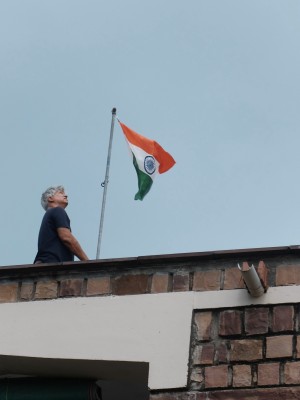 15th August, Independence Day, was a normal working day for the women and Vijay put up the Indian flag on our roof as part of the national campaign ‘Har Ghar Tiranga’ or ‘On Every House the Tri-colour’. One woman rejoined the weeding team, having come back safely from a family pilgrimage to Shri Mata Vaishno Devi shrine 5,200’ up in Jammu and Kashmir. There is a direct train from Kota that takes 17 hours and then the last 13 kms. are covered on foot or on ponies or palanquins. A ropeway will be finished soon. The rich take helicopters. Kamala and ten family members, carrying a young girl between them, walked barefoot in the rain "A whole day and a whole night" as she remembered. Over nine million pilgrims visit Vaishno Devi a year.
15th August, Independence Day, was a normal working day for the women and Vijay put up the Indian flag on our roof as part of the national campaign ‘Har Ghar Tiranga’ or ‘On Every House the Tri-colour’. One woman rejoined the weeding team, having come back safely from a family pilgrimage to Shri Mata Vaishno Devi shrine 5,200’ up in Jammu and Kashmir. There is a direct train from Kota that takes 17 hours and then the last 13 kms. are covered on foot or on ponies or palanquins. A ropeway will be finished soon. The rich take helicopters. Kamala and ten family members, carrying a young girl between them, walked barefoot in the rain "A whole day and a whole night" as she remembered. Over nine million pilgrims visit Vaishno Devi a year.

An ongoing saga that is taking indefinite time is trying to get Bardhi Bai’s provident fund for her out of the system. Another document has been submitted and I am still pursuing for a successful outcome.

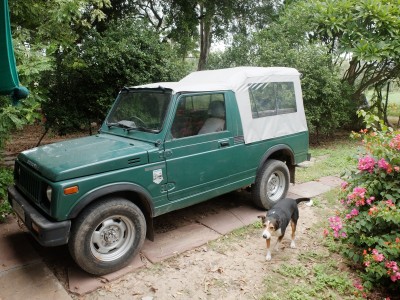 One outstanding matter that has been resolved is re-registering the Maruti Gypsy. When bought in 1991, there was a lifetime registration fee for the original owner. Since then we as second owners have to re-register it every five years as per current law. We had not realised that the last five-year period had expired in March 2022 which resulted in a monthly penalty since then of Rs. 500 per month plus a hefty fee to an agent to expedite re-registration. The Gypsy needed a new exhaust system, brakes and a hood, but the alternative was scrapping it which would have been painful for "Gypsy Madam".
One outstanding matter that has been resolved is re-registering the Maruti Gypsy. When bought in 1991, there was a lifetime registration fee for the original owner. Since then we as second owners have to re-register it every five years as per current law. We had not realised that the last five-year period had expired in March 2022 which resulted in a monthly penalty since then of Rs. 500 per month plus a hefty fee to an agent to expedite re-registration. The Gypsy needed a new exhaust system, brakes and a hood, but the alternative was scrapping it which would have been painful for "Gypsy Madam".

And August ended on a ‘Blue Moon’ note with a second full moon happening in the same month which is a rare event. India also successfully landed Chandrayaan-3 on the unseen from Earth far side of the moon at the south pole, being the first country ever to do so. Within hours it had discovered that although the temperature at the surface is 50oC, only 8.2 cms. underneath the surface the temperature is -10oC. An unexpected finding and the first of many.

On the Farm - July ’23
July is the rice planting month and adequate rain is key. There had been nearly 15 cms. of rain in June which is unusual so the fields were too wet to plough and prepare for rice and green manure. Before floodiing a rice field you have to prepare the dolis by tractor and we couldn’t do this until the 7th when we just got them done in time before heavy rain.
It rained on 17 different days in July but never very heavily and was well spread out giving a total of 18.6 cms. The birds love flooded fields after the dryness of summer and all sorts of goodies must appear at the surface to be eaten. The farm goes from dry brown to verdant green in two weeks and it is very humid and hot in the mid-thirties. Rain had been pouring through our ceiling but we identified the problem and dealt with it.

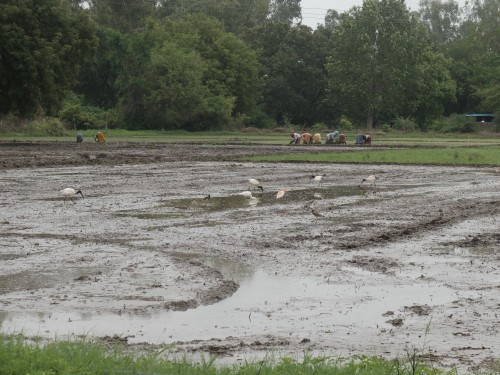 On 4th and 5th July some dhaincha was broadcast and some urad as green manure. Once the dolis or soil ridges were made for irrigation control the tractor could guddle and break up the fine clay and then the women’s rice planting team moved in. White ibis enjoying a flooded field.
On 4th and 5th July some dhaincha was broadcast and some urad as green manure. Once the dolis or soil ridges were made for irrigation control the tractor could guddle and break up the fine clay and then the women’s rice planting team moved in. White ibis enjoying a flooded field.
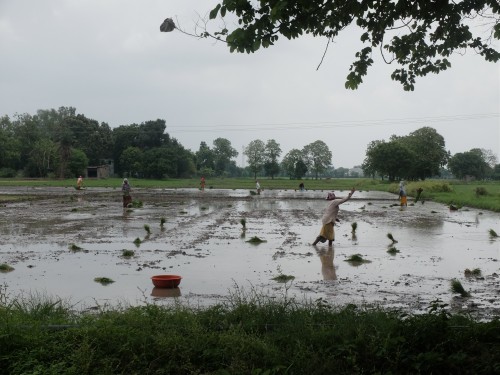 The women bring the rice seedlings from the nursery on the next farm in bundles. They then throw them expertly to spread them out just where they need them in the flooded field.
The women bring the rice seedlings from the nursery on the next farm in bundles. They then throw them expertly to spread them out just where they need them in the flooded field.
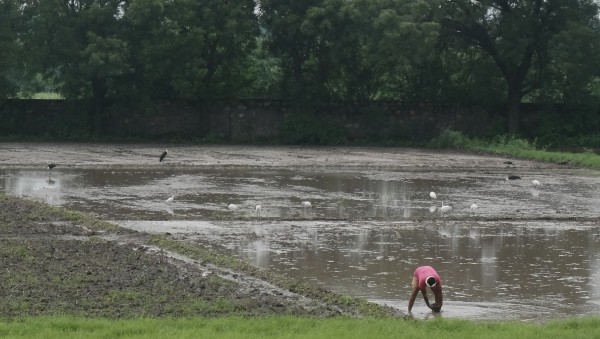 White-necked storks join ibis in enjoying the flooded fields.
White-necked storks join ibis in enjoying the flooded fields.
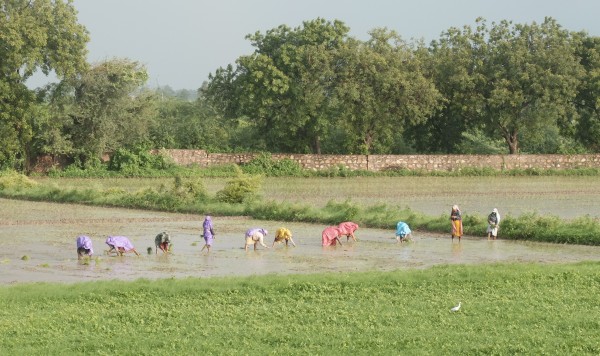 The women go on planting through heavy rain unless there is lightning when we insist they come into the veranda. They carry colourful plastic capes with them to keep them dry. This photo was taken towards the end of the rice planting on 23rd July. The sun had come out and the eleven women looked like a row of colourful cranes! Do the water birds see them as fellow feeders?
The women go on planting through heavy rain unless there is lightning when we insist they come into the veranda. They carry colourful plastic capes with them to keep them dry. This photo was taken towards the end of the rice planting on 23rd July. The sun had come out and the eleven women looked like a row of colourful cranes! Do the water birds see them as fellow feeders?

A health problem for humans this month was conjunctivitis known as eye flu which has affected all our workers and their children and has been a problem in Jaipur and Delhi as well (likely in many other areas as well). Children are asked not to come to school but most adults seem to carry on regardless spreading it around as they do.
Despite seasonal infections some people seem to live to a great age. Laxman went to his Nana’s funeral in Jhalawar district. He claimed she was 120 and had ten children who were all living. She had new white hair but no new teeth and had had no illnesses before her final two months in bed spent at home cared for by family members.
My subzee seller claims her Nana is having breathing problems at 106. She claims she has regrown hair and teeth!
The moral would appear to be to keep away from doctors and allopathic medicine and hospitals!

On the Farm - June ’23
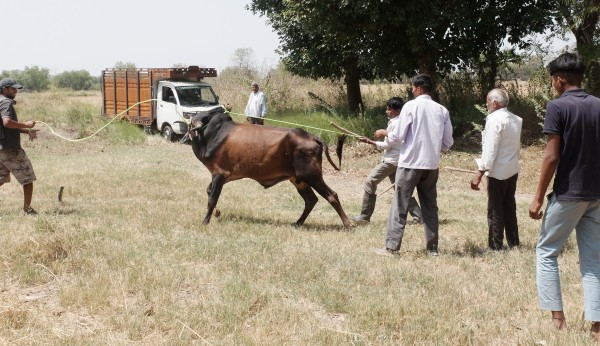 Our negotiations with the local cow hospice reached the point of being able to deliver some unwanted young males to the gaushala in town which houses about 150 head of cattle and they appear to be being looked after. It is illegal to sell cattle for slaughter and so moving them around attracts interest from the police. I furnished the driver of the vehicle with a letter for the gaushala and Vijay accompanied the van. It took the ring road rather than a more direct route and all precautions had to be taken to prevent being stopped for 'cow smuggling'.
Our negotiations with the local cow hospice reached the point of being able to deliver some unwanted young males to the gaushala in town which houses about 150 head of cattle and they appear to be being looked after. It is illegal to sell cattle for slaughter and so moving them around attracts interest from the police. I furnished the driver of the vehicle with a letter for the gaushala and Vijay accompanied the van. It took the ring road rather than a more direct route and all precautions had to be taken to prevent being stopped for 'cow smuggling'.
An elderly cow was loaded first, but Henry, an up and coming bull said to be infertile, refused to go and was given a reprieve. Three young males were persuaded into the van and one known to us as Bojo was definitely surplus to requirements and so we managed to diminish the herd by four.
Having solved the problem of surplus animals we were then faced with a smaller but more virulent problem, that of termites. While trying to open a drawer it was found to be stuck tight with termite trails as were the two below it. On examination, termites had come through the floor and were chewing their way through everything in the fitted cupboards. Depressing to say the least. We had to empty every cupboard, drawer and book shelf and sort the ravaged from the clean and decide what to burn. Several pairs of leather shoes and my father’s leather cricket bag from the 1930’s went to be burned. It pays to have few possessions.

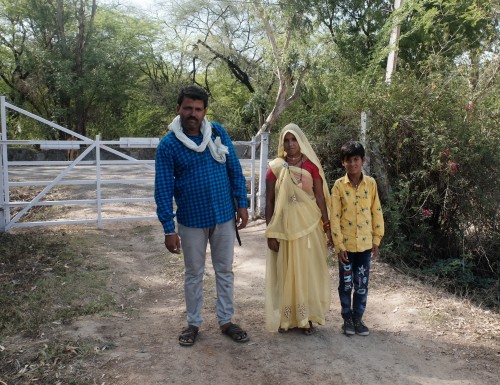 On 6th June our new hali Dinesh and his second wife, Chandini, and 10-year old son Gautam from his first marriage were received at the gate. They had travelled by bus from Madhya Pradesh with a knapsack full of clothes and sack containing some cooking utensils and a few onions.
On 6th June our new hali Dinesh and his second wife, Chandini, and 10-year old son Gautam from his first marriage were received at the gate. They had travelled by bus from Madhya Pradesh with a knapsack full of clothes and sack containing some cooking utensils and a few onions.
Dinesh had worked for us before when his son Gautam was much younger and was being looked after by Dinesh’s mother here. His first wife had left for another man with their young baby and he could not manage on his own here after his mother returned to her village. He went home to his parents’ so she could look after young Gautam and he became a daily labourer. Now with a second wife, and subsequent debts, he needed regular work to pay them off. He told a story of a bus ride in which he, Chandini and Gautam had survived an accident when the bus fell 30 feet into a ravine. He had to extricate Chandini from the wreckage where she was trapped and had sustained a fracture. She seems to have fully recovered now and is a loving stepmother. You can see that she is wearing her sari in a tribal style, unusual for here, with a big brooch fastening the pallu at the front.
We provided beds, lockable steel cupboard, bedding, a fan, a bicycle and a rat trap. Later we gave a desert cooler, and a gas cooker for wet days.

It did not rain in June until 24th and herds of camel and sheep and their Raika tribal owners from Pali district were camping locally looking for fodder. This is an annual migration and they go back once the rains arrive. By the time they reach their home areas the grass has grown locally to provide fodder for their animals.
On 14th June a Raika herdsman named Rama came into the farm saying he was searching for a camel. Then he proceeded to seek permission to bring his flock of sheep to our farm and they arrived at 1.00pm. He and one his four daughters called Pappu were herding about 300 recently shorn sheep. Pappu had come by bus from Pali to join her father to help herd. They were keen on being photographed and I sent some photos to Pappu’s sister in their dera or camp. They also came to water the sheep the following day despite our cow man complaining that the cows did not like eating vegetation that sheep had wee’d on. By the next day they had gone.
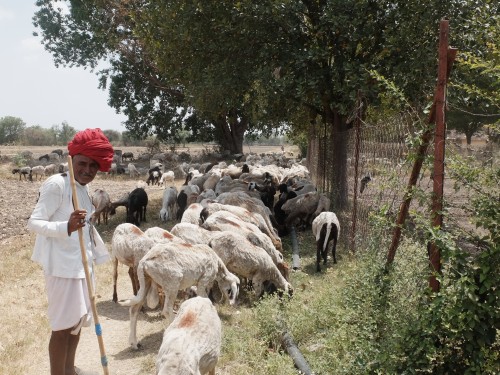
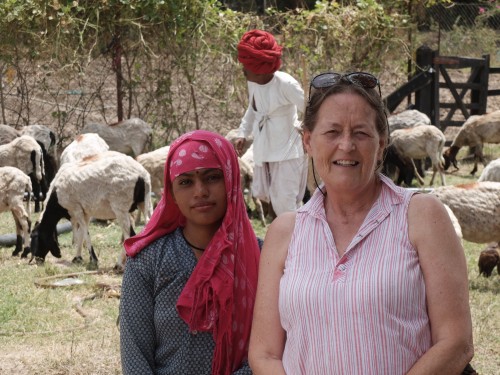
A cyclone called Biperjoy hit the Gujarat coast on the 16th and flooded Pali district the nomadic Raika people’s home. We had strong winds being on the edge of the cyclone which brought down one neem tree on the border of a field, but no rain.

We built a tin shed for the cow man’s family so they could cook under it during the monsoon. Holes for the four posts were dug on 17th June and the welder made several visits before coinciding with electricity supply. By the end of June the tin shed had been erected and a gutter had been attached, held with ingenious supporting brackets.
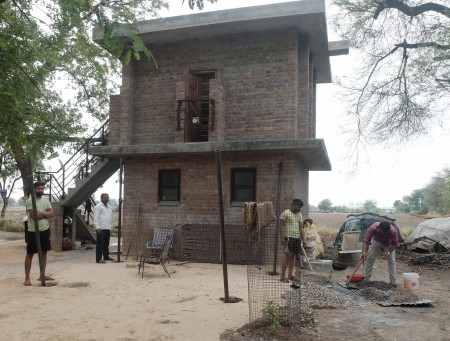
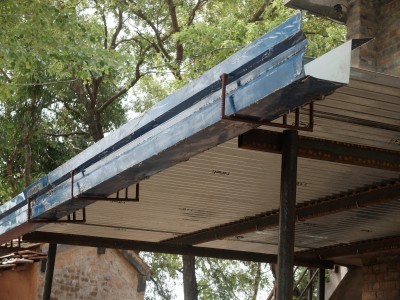
Rain arrived on the 24th and by the end of June we had had 14.83 cms. Some bursts were so heavy it came through the house roof.

The main farming activity had been cutting the jhar or undergrowth around the edges of the fields and the men tended to burn sections which distressed us as it’s home to much wildlife.
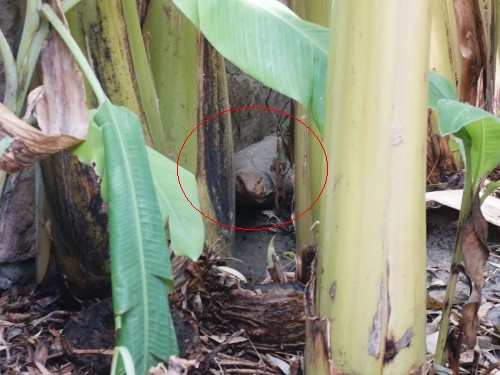 Here to finish with is a photo of a large monitor lizard looking straight at the camera from behind the banana trees. This monitor lizard had lost a section of its tail. When chased away it ran over the flag stones with a loud thump-thump-thump.
Here to finish with is a photo of a large monitor lizard looking straight at the camera from behind the banana trees. This monitor lizard had lost a section of its tail. When chased away it ran over the flag stones with a loud thump-thump-thump.

On the Farm - May ’23
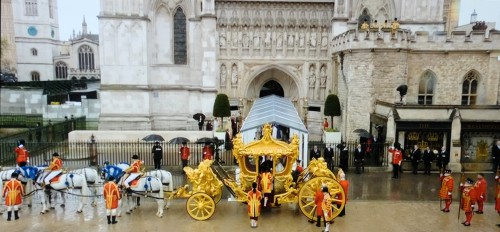 May brought a tale of two coaches. On 6th May King Charles III was crowned in London and he rode away from Westminster Abbey in a splendid well maintained fairy tale coach that had been dreamed up in 1760.
May brought a tale of two coaches. On 6th May King Charles III was crowned in London and he rode away from Westminster Abbey in a splendid well maintained fairy tale coach that had been dreamed up in 1760.
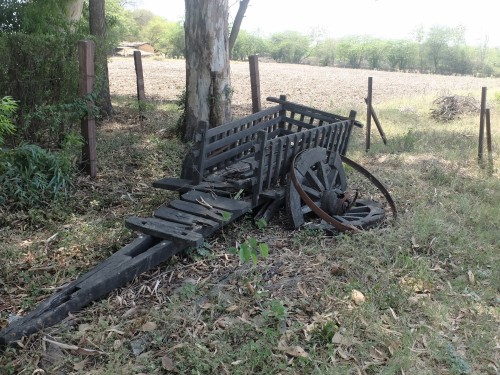 Meanwhile here on the farm, May was the month in which our trusty bullock cart of yore, a variation of a 4000 year old design, finally collapsed from lack of maintenance. The termites eat the wood and every year parts need replacing and haven’t been for at least ten years. 25 year ago it took fodder to the Dushera Mela when young bulls were being sold and our son, aged 11, rode on it. It featured in a film on The Raj driven by someone obviously Punjabi and not Rajasthani but the BBC documentary editor didn’t seem to mind. Tourists and visitors have been for picnics on it, including my 89 year old father in 1999. I rode in it in 1980 when first visiting the farm in the days when two large bullocks were kept for the sole purpose of drawing it. It rattled and creaked when it was pulled slowly along the canal to the amusement of the villagers.
Meanwhile here on the farm, May was the month in which our trusty bullock cart of yore, a variation of a 4000 year old design, finally collapsed from lack of maintenance. The termites eat the wood and every year parts need replacing and haven’t been for at least ten years. 25 year ago it took fodder to the Dushera Mela when young bulls were being sold and our son, aged 11, rode on it. It featured in a film on The Raj driven by someone obviously Punjabi and not Rajasthani but the BBC documentary editor didn’t seem to mind. Tourists and visitors have been for picnics on it, including my 89 year old father in 1999. I rode in it in 1980 when first visiting the farm in the days when two large bullocks were kept for the sole purpose of drawing it. It rattled and creaked when it was pulled slowly along the canal to the amusement of the villagers.
Coronation Day in London was wet and we have continued to have more showers than normal here which has kept the temperature down to the mid- to late- thirties rather than the mid-forties. The trees with their fresh green leaves have sparkled after the rain.

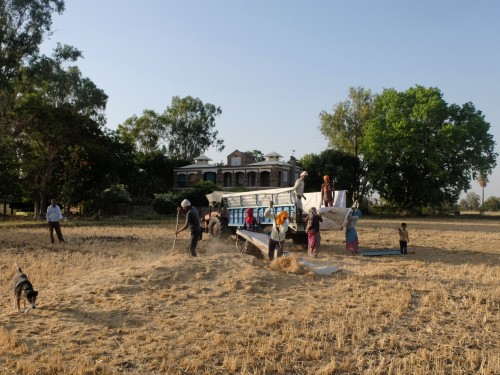 Although the wheat was harvested in April we sold most of it in May and kept it under black plastic sheeting known as tirpals until 16th May when the first of three trolley loads grown by Ghansi Lal left for the mandi. We continued to sell our wheat from the farm since the first trolley load last month had set a market rate of Rs. 2420/100 kgs.
Although the wheat was harvested in April we sold most of it in May and kept it under black plastic sheeting known as tirpals until 16th May when the first of three trolley loads grown by Ghansi Lal left for the mandi. We continued to sell our wheat from the farm since the first trolley load last month had set a market rate of Rs. 2420/100 kgs.
After the wheat was sold the bhousa had to be picked up from where it had been left from the threshing at multiple points and a family team of ten people came to do it. They worked in the hot sun for two days until they had loaded 14 trolleys worth. They demanded chai twice a day and complained it was not sweet enough!

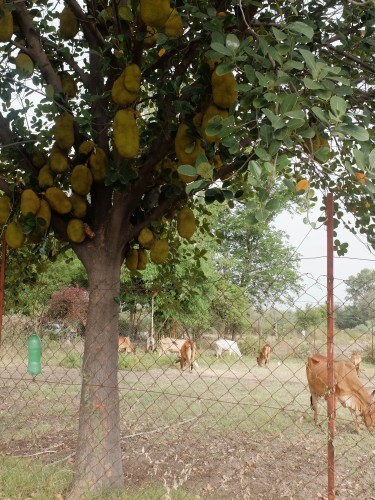 The fields were tilled for the first time after the harvest so the cows had to pick their way around the edges and nibble the hedges. They were allowed into the subjee patch after the last green tomato had been picked and the basil seeds collected. Interestingly, cows do not eat basil! You can see the jackfruit hanging on the tree. Each worker gets one jackfruit a week while ‘stocks last’.
The fields were tilled for the first time after the harvest so the cows had to pick their way around the edges and nibble the hedges. They were allowed into the subjee patch after the last green tomato had been picked and the basil seeds collected. Interestingly, cows do not eat basil! You can see the jackfruit hanging on the tree. Each worker gets one jackfruit a week while ‘stocks last’.
We started to face up to how to deal with the surplus cattle. None of them were ‘worth anything’ in financial terms. We started by selling the most recent calf, born on 29th April, and her mother for a rupee each. We seem to run a cow hospice. One very lame cow has a dislocated front leg and the barbaric treatment was done too late so the joint did not mend. She received her injury from a malevolent cow in early life. She looks six months old but is six years old. Her back legs have become so weak she needs help to get up quite often. She will be staying with us but negotiations were entered into for giving unwanted males to the town’s gaushala.

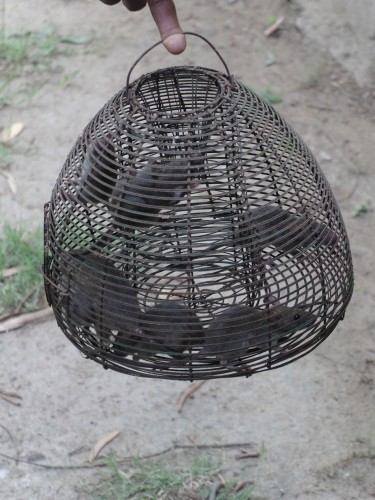 In May we were on the lookout for a new hali to replace Ranjeet. We were hoping for a non-smoker under 40 with a young family wanting to live separately from their parents and willing to do physical labour. The first man interested was over 50 and wheezy so we rejected him. The next man who turned up needing a job and having a wife and child seemed interested but did not come back the next day as promised and did not answer his phone. Our cow-man, Narayan, although only in his 40’s has ruined his lungs through smoking bidis and had a health scare on 24th May when his sons appeared at 06.00 am asking us to take him to a hospital. Rs. 5,000 and a battery of tests later he was sent home with a few days worth of expensive injections and tablets. He now knows his heart and BP are fine but his lungs are in a bad way and if he continues to smoke the consequences will be very serious and we are not going to pay as it is self inflicted. With no occupant in the hali’s house the rats had a field day but seven were caught at once in this ingenious beehive shaped trap. By the end of the month we were still waiting for the right person to turn up.
In May we were on the lookout for a new hali to replace Ranjeet. We were hoping for a non-smoker under 40 with a young family wanting to live separately from their parents and willing to do physical labour. The first man interested was over 50 and wheezy so we rejected him. The next man who turned up needing a job and having a wife and child seemed interested but did not come back the next day as promised and did not answer his phone. Our cow-man, Narayan, although only in his 40’s has ruined his lungs through smoking bidis and had a health scare on 24th May when his sons appeared at 06.00 am asking us to take him to a hospital. Rs. 5,000 and a battery of tests later he was sent home with a few days worth of expensive injections and tablets. He now knows his heart and BP are fine but his lungs are in a bad way and if he continues to smoke the consequences will be very serious and we are not going to pay as it is self inflicted. With no occupant in the hali’s house the rats had a field day but seven were caught at once in this ingenious beehive shaped trap. By the end of the month we were still waiting for the right person to turn up.

We are still waiting for Bardhi Bai’s case for her provident fund with the former employer to be resolved. See each month back to November to follow the saga. I am told her case is ‘under process’ but how long can it take?

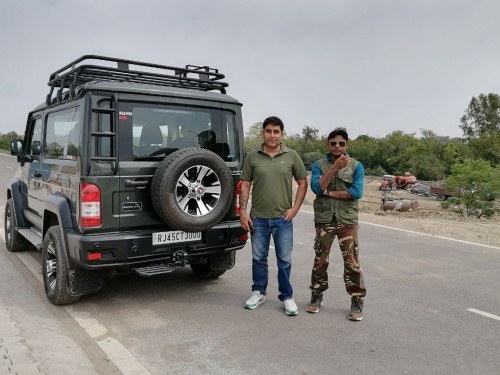 We used to be able to hear sarus cranes and their breeding grounds are near here but pressure for development has driven them away with the Kaithoon bye-pass being built through their reserve and a garbage transfer station being developed nearby. I was featured on ‘Wild News India’ channel speaking in Hindi in their defence. The garbage transfer station is being built behind the camera crew below the canal (photo). Sumit Juneja on the left and Anil Rodgers run the channel.
We used to be able to hear sarus cranes and their breeding grounds are near here but pressure for development has driven them away with the Kaithoon bye-pass being built through their reserve and a garbage transfer station being developed nearby. I was featured on ‘Wild News India’ channel speaking in Hindi in their defence. The garbage transfer station is being built behind the camera crew below the canal (photo). Sumit Juneja on the left and Anil Rodgers run the channel.

On the Farm - April ’23
April is the wheat harvesting month and we hope for dry weather but the unsettled conditions of March continued and we had dust storms on four evenings followed by rain. The benefit was that April was unusually cool and rather muggy with some spectacular sunsets and sunrises - see photo below.
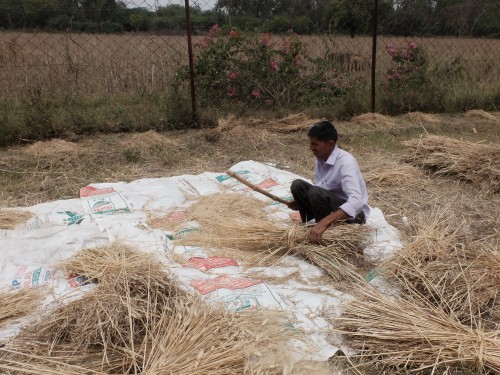 Our son and grandchildren were here at the beginning of April but all left before the main wheat harvest. The bansi wheat was cut by hand and threshed by beating it with a stick as the quantity was so small.
Our son and grandchildren were here at the beginning of April but all left before the main wheat harvest. The bansi wheat was cut by hand and threshed by beating it with a stick as the quantity was so small.
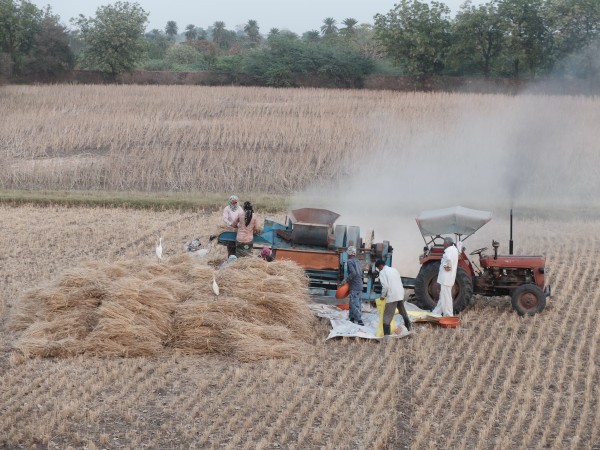 The house wheat was hand cut by a team of women and threshed by machine mostly at night. Each year the team gets smaller and their demands in payment in kind as a share of the grain harvest for their work increases. They earn 100 kgs. per bigha which amounts to about 1/6 of the crop. They cut each stalk close to the ground and the field can be ploughed straight away once the wheat chaff has been removed from the fields - no burning of stubble.
The house wheat was hand cut by a team of women and threshed by machine mostly at night. Each year the team gets smaller and their demands in payment in kind as a share of the grain harvest for their work increases. They earn 100 kgs. per bigha which amounts to about 1/6 of the crop. They cut each stalk close to the ground and the field can be ploughed straight away once the wheat chaff has been removed from the fields - no burning of stubble.

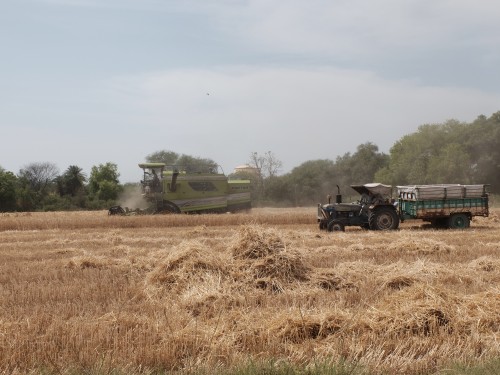 Half of our farm wheat and increasingly the wheat in the surrounding farms is cut by combine. The stubble left behind is much longer and the straw is scattered about. A hay cutting machine was employed to drive slowly up and down the field cutting the stubble and gathering the straw. We get paid only Rs. 273 per bigha but we can plough and are not tempted to burn the stubble. Our cows enjoy the bhusa or chaff from the hand cut fields produced after threshing (photo above).
Half of our farm wheat and increasingly the wheat in the surrounding farms is cut by combine. The stubble left behind is much longer and the straw is scattered about. A hay cutting machine was employed to drive slowly up and down the field cutting the stubble and gathering the straw. We get paid only Rs. 273 per bigha but we can plough and are not tempted to burn the stubble. Our cows enjoy the bhusa or chaff from the hand cut fields produced after threshing (photo above).

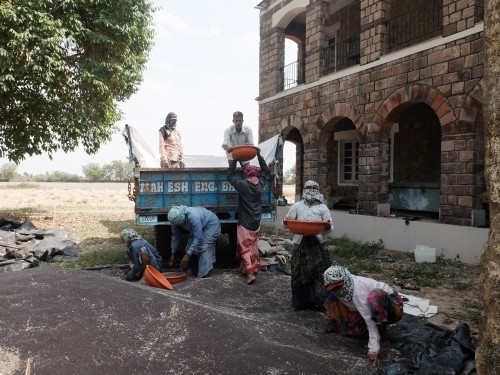 The mustard had been cut in March but the price was low. It showed no sign of regaining its last year’s price and we finally called the women to fill the trolley and to sell the mustard at the market on the 13th. It sold for Rs. 52.8/kg. whereas last year it had been Rs. 67.5 and 10% more in weight. But this year we grew a different variety called Giriraj which might account for a difference in weight. We sold the mustard chaff to a contractor who collects it and we think it’s sold on to the DSCL factory near here for firing the boiler. It is cheaper for them than oil, we assume.
The mustard had been cut in March but the price was low. It showed no sign of regaining its last year’s price and we finally called the women to fill the trolley and to sell the mustard at the market on the 13th. It sold for Rs. 52.8/kg. whereas last year it had been Rs. 67.5 and 10% more in weight. But this year we grew a different variety called Giriraj which might account for a difference in weight. We sold the mustard chaff to a contractor who collects it and we think it’s sold on to the DSCL factory near here for firing the boiler. It is cheaper for them than oil, we assume.

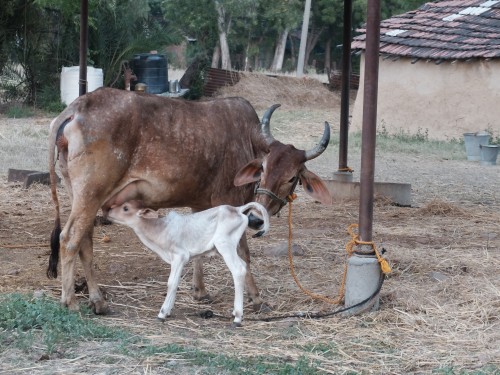 We had two female calves born in April. Nandi, pictured here, on the 11th and Varsha (meaning rain) during the rain on the 29th. We now have more than 20 heads of cattle and need to reduce the numbers.
We had two female calves born in April. Nandi, pictured here, on the 11th and Varsha (meaning rain) during the rain on the 29th. We now have more than 20 heads of cattle and need to reduce the numbers.

We finally sacked our halli Ranjit after repeated warnings for drunkeness, and theft, but his children (and wife) stayed on in his house until their school exams were over. They all moved out on the 16th and are renting a room nearby. Ranjit now has a job in a flour mill and we hope he can keep off the booze and make a fresh start.

The saga of Bardhi Bai goes on. Her corrected papers were submitted in mid-April and her case is ‘under process’.

Our neighbour, and relation, Lt. Gen. Ajai Singh, former governor of Assam passed away in Delhi aged 86 on the night of 17-18th. But a few days before he died he sent a letter to the present governor of Rajasthan requesting that a proposed garbage transfer station being built in the wetlands next to the Umedganj canal and the bird sanctuary known as Pakshi Vihar be moved. That is our next campaign.

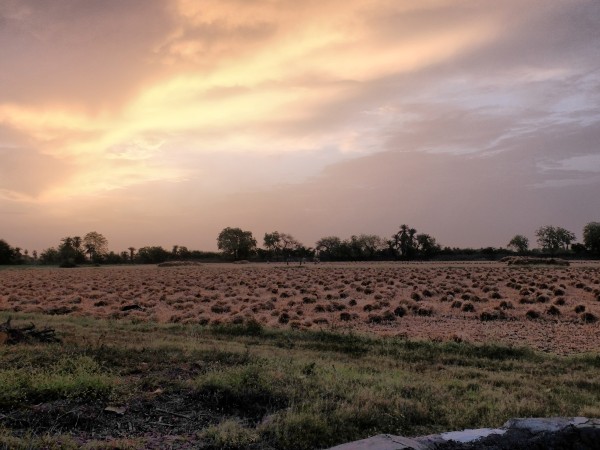 Dawn over the wheat harvest. In the distance the women are piling the harvested wheat in the cool hours of early morning in preparation for threshing in the evening.
Dawn over the wheat harvest. In the distance the women are piling the harvested wheat in the cool hours of early morning in preparation for threshing in the evening.

On the Farm - March ’23
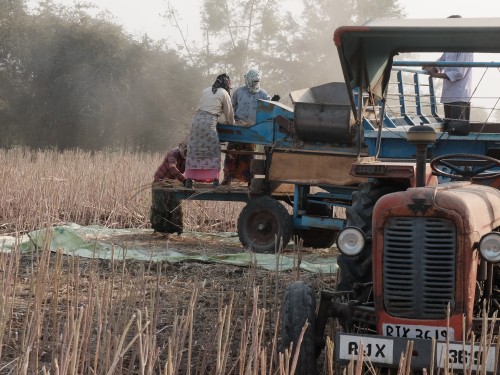 We had 10 days with some rain in March and rushed to thresh the mustard crop before the first shower. On 1st March the thresher arrived and it took 2 days to finish. We sold for Rs. 5280 for 100 kgs. which was well below last year’s record price of Rs. 6751. The yield was well down too, which can be attributed to a warm winter, but the temperature remained below 40oC but still above the ideal temperature for mustard. The word on the grapevine was that yields were down for most farmers in the area.
We had 10 days with some rain in March and rushed to thresh the mustard crop before the first shower. On 1st March the thresher arrived and it took 2 days to finish. We sold for Rs. 5280 for 100 kgs. which was well below last year’s record price of Rs. 6751. The yield was well down too, which can be attributed to a warm winter, but the temperature remained below 40oC but still above the ideal temperature for mustard. The word on the grapevine was that yields were down for most farmers in the area.
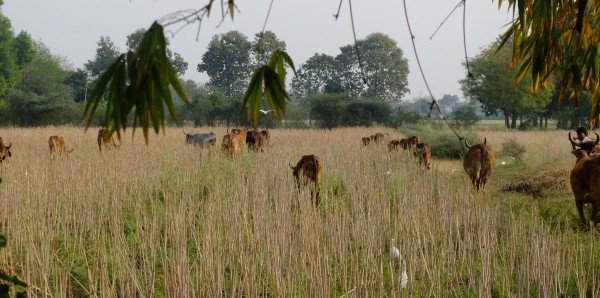 Once the mustard had been threshed the cows could be let out to graze in the mustard fields.
Once the mustard had been threshed the cows could be let out to graze in the mustard fields.
 Another male calf was born on 19th March to Poonam. He is called Chand or Moon.
Another male calf was born on 19th March to Poonam. He is called Chand or Moon.

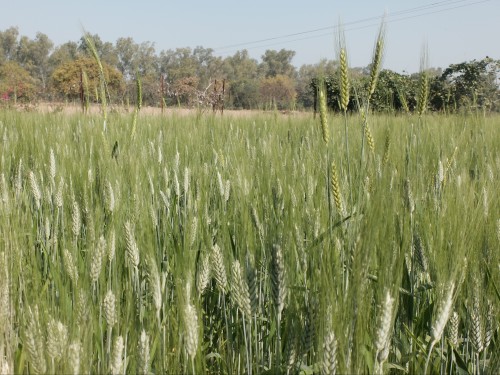 The wheat was swelling well and it was a constant battle to scare wildlife away, especially the very destructive nilgai. This bansi wheat is a traditional variety which has come from a tribal seed farm in Maharashtra. We had 1/2 kg. to start with here and were growing it for seed. We now have 151/2 kg. and will grow it next season for seed mainly and hopefully some for consumption. The taller or rogni wheat plants, shown in this photgraph, had to be pulled out by hand.
The wheat was swelling well and it was a constant battle to scare wildlife away, especially the very destructive nilgai. This bansi wheat is a traditional variety which has come from a tribal seed farm in Maharashtra. We had 1/2 kg. to start with here and were growing it for seed. We now have 151/2 kg. and will grow it next season for seed mainly and hopefully some for consumption. The taller or rogni wheat plants, shown in this photgraph, had to be pulled out by hand.

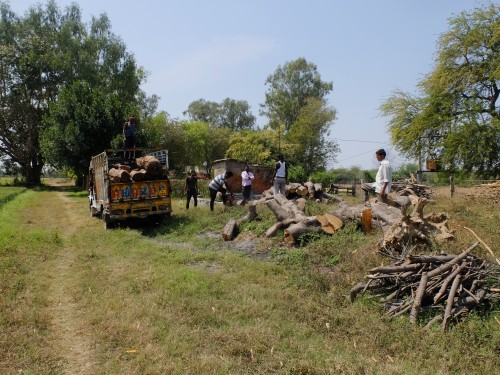 A team of men with a truck came to collect the dead timber on the farm including our beloved gul mohar tree from near the well. Vijay had cut it into convenient lengths. They also had a chainsaw to make further cuts.
A team of men with a truck came to collect the dead timber on the farm including our beloved gul mohar tree from near the well. Vijay had cut it into convenient lengths. They also had a chainsaw to make further cuts.

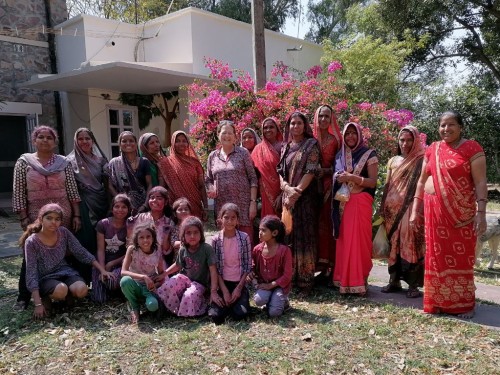 7th was Holi. The dancing, singing women have not been for the last three years but I asked them specially so they bypassed the other farms and came to us. It was already lunch time and Sugna emerged from the kitchen and joined in. The gangs of little boys we used to get no longer make the effort to walk out here.
7th was Holi. The dancing, singing women have not been for the last three years but I asked them specially so they bypassed the other farms and came to us. It was already lunch time and Sugna emerged from the kitchen and joined in. The gangs of little boys we used to get no longer make the effort to walk out here.

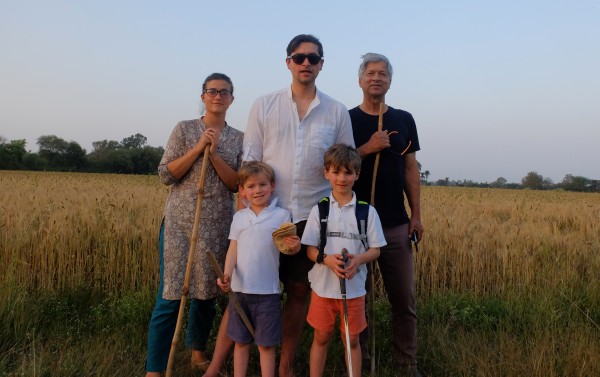 All March we had been working towards a visit by our son, Anand, and his two boys Henry aged 7 and Arthur aged 5. It was our grandsons’ first visit to India and they had a wonderful variety of experiences. Our daughter, Anjali, returned from six months travelling in India and we could spend some time together before they all flew away together to the UK.
All March we had been working towards a visit by our son, Anand, and his two boys Henry aged 7 and Arthur aged 5. It was our grandsons’ first visit to India and they had a wonderful variety of experiences. Our daughter, Anjali, returned from six months travelling in India and we could spend some time together before they all flew away together to the UK.
Here is an evening expedition to feed the cows with rotis and kitchen leftovers.

The Bardhi Bai saga has not progressed (see November 2022). But we haven’t given up and have been pushing. Hopefully there will be a resolution next month? It looked as if an OTP or one-time-password to her phone was going to be necessary, and since there is weak signal in her village her son left his phone with us for a day, but false alarm and it was all for nought. High tech systems far outpace our infrastructure.

On the Farm - February ’23
A strong animal theme this month. We had not a drop of rain but we started with coolish nights at 10oC/11oC but remarkably hot days. In fact it was the hottest February on record despite heavy snows in the Himalayas and the cold of January.
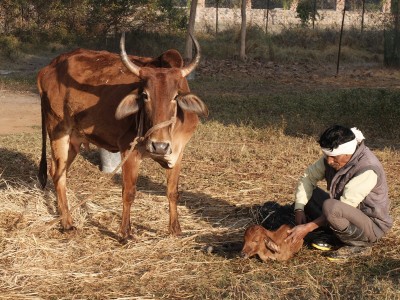 Suraj was born to Tiku on 2nd February. Another male. He was very weak but with hot sun and mother’s milk he was soon standing and tottering. We are buying 50 kg. bags of churi which is chickpea skins, and khul which is cotton seed cake after the oil has been pressed out. The cows also get bersim, an alfalfa type fodder, and rice straws. The milk is thick and creamy but can only be sold for Rs.28/kg. to the 'doodh wallah', who comes to the gate every morning on his motorbike with his brass churries hanging off it. To get good milk and cream for the house we are paying dearly.
Suraj was born to Tiku on 2nd February. Another male. He was very weak but with hot sun and mother’s milk he was soon standing and tottering. We are buying 50 kg. bags of churi which is chickpea skins, and khul which is cotton seed cake after the oil has been pressed out. The cows also get bersim, an alfalfa type fodder, and rice straws. The milk is thick and creamy but can only be sold for Rs.28/kg. to the 'doodh wallah', who comes to the gate every morning on his motorbike with his brass churries hanging off it. To get good milk and cream for the house we are paying dearly.
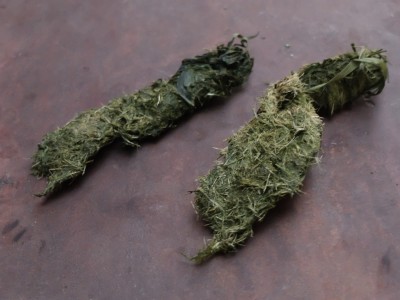 The young wheat was watered and as the month progressed the ears developed. The wild pigs chew on the green wheat and extract the goodness. They then spit out the residue. We find these little offerings as we walk around the farm.
The young wheat was watered and as the month progressed the ears developed. The wild pigs chew on the green wheat and extract the goodness. They then spit out the residue. We find these little offerings as we walk around the farm.
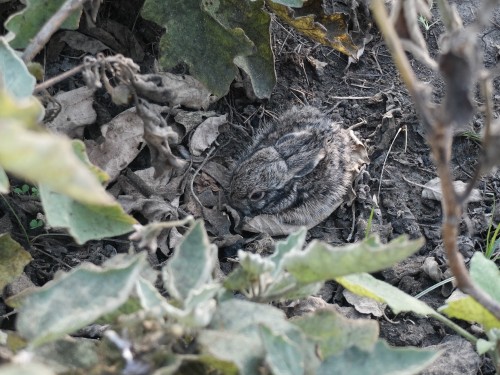 Along with upto 14 wild pigs and 12 nilgai that have been spotted, we have a few hares. Sadly, Lucy and Doosra were caught with one. It was skinned and cooked for them and the dogs enjoyed hare stew for three nights. We hope it wasn’t the mother of this little leveret spotted living in the aubergine patch.
Along with upto 14 wild pigs and 12 nilgai that have been spotted, we have a few hares. Sadly, Lucy and Doosra were caught with one. It was skinned and cooked for them and the dogs enjoyed hare stew for three nights. We hope it wasn’t the mother of this little leveret spotted living in the aubergine patch.

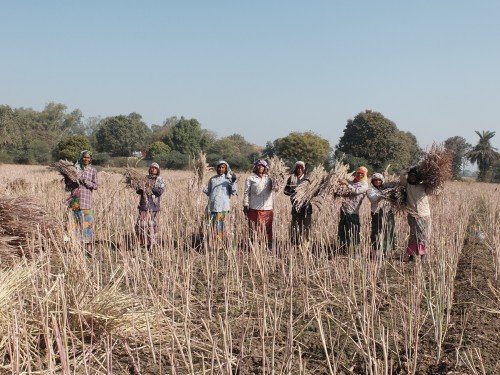 Along with young wheat we have been growing mustard. A team of eight women came to start cutting on 16th February, once they had cut the mustard on the next door farm. The wild pigs that had been living in their mustard moved over to our farm. The air was thick with little flies at that time both in town and in the mustard fields. They sucked the juice out of rocket salad leaves that had been doing well and our experimental broccoli being tried for the first time. Other vegetables such as tomatoes and potatoes were unaffected.
Along with young wheat we have been growing mustard. A team of eight women came to start cutting on 16th February, once they had cut the mustard on the next door farm. The wild pigs that had been living in their mustard moved over to our farm. The air was thick with little flies at that time both in town and in the mustard fields. They sucked the juice out of rocket salad leaves that had been doing well and our experimental broccoli being tried for the first time. Other vegetables such as tomatoes and potatoes were unaffected.
After the women had cut the mustard it dried in the fields and then before threshing was piled up into small mounds called gullas.

Different people have different ways of making ends meet. One lady called Mamta Sharma calls on the farms around here every few months to ask for money and food. She is a widow and always has tragic stories to tell. She rents a room in Kota and must get a basic pension of Rs. 750 a month but it won’t even pay the rent. We gave her money and 3 kgs. of rice.
Ranjeet, who works for us, was caught selling our metal angle irons to a nearby trader for Rs.90/kg. which is the going rate. He had to return the angle irons and was given notice but since his three boys are having exams he can stay until his year is up in May. Although his earnings are paid direct into his wife’s bank account, he has access to the ATM card with which he can withdraw drink money.

The Bardhi Bai story has not progressed in a month. Her employers used an arbitrary date of birth for her in the absence of documentary proof but now she is claiming a different date of birth and the Provident Fund will not pay up. The employers have to sort it out and haven’t. "Just give us a few more days..." etc.

And a new development to worry about is that the Municipal Authorities are planning to bring small open trucks with rubbish from the town to a compressing plant next to the canal and close to a bird sanctuary. They claim that the rubbish will be then 'transferred' to the trenching ground/landfill on the other side of town. There has been no planning process or discussions with locals for this plan. The Opposition politicians say they oppose it and won’t allow it but is this political posturing? Watch this space....

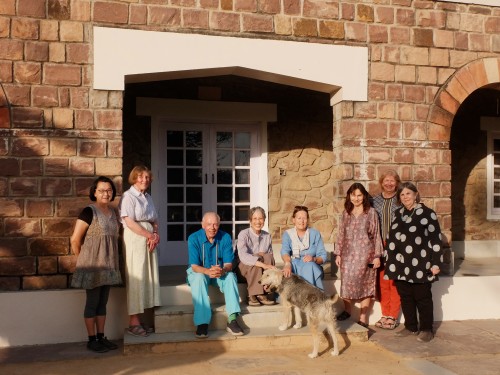 And to finish with a photo of an international group from the Royal Asiatic Society travelling around Rajasthan in the footsteps of Col. James Todd who was Political Agent for the East India Company two hundred years ago and wrote 'Annals and Antiquities of Rajasthan'.
And to finish with a photo of an international group from the Royal Asiatic Society travelling around Rajasthan in the footsteps of Col. James Todd who was Political Agent for the East India Company two hundred years ago and wrote 'Annals and Antiquities of Rajasthan'.

On the Farm - January ’23
January is always the coldest month and we had some night temperatures of 5oC and misty days when the sun barely came through at all.
We have had no rain since October and the main farm activity was watering the wheat and protecting it from the pigs and nilgai.

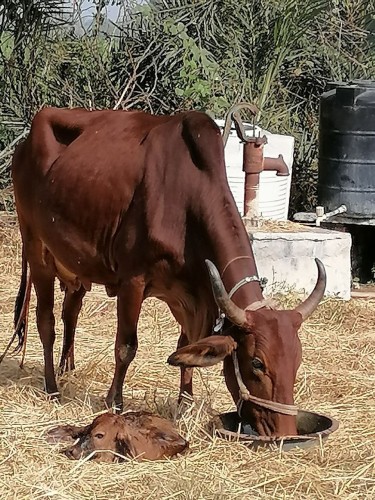 On 5th January it was a misty morning but the sun came through at 1.30pm just in time for Charlotte to have her fifth calf, another male called Kohra meaning mist. He gradually warmed up in the sun and was soon strong enought to stand up and suckle. Charlotte was born in 2012 and is named after the young designer who designed our drawing room suite fabric based on our own plants.
On 5th January it was a misty morning but the sun came through at 1.30pm just in time for Charlotte to have her fifth calf, another male called Kohra meaning mist. He gradually warmed up in the sun and was soon strong enought to stand up and suckle. Charlotte was born in 2012 and is named after the young designer who designed our drawing room suite fabric based on our own plants.

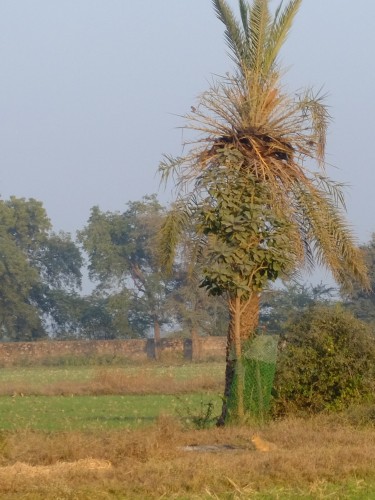 The young wheat was short and tempting for wild life: there is so much about we are unaware of. One night while Vijay was standing quietly watching for wild pigs a jungle cat shot past him and ran along the verandah. You can see that the palm tree looks strange. Some of the fronds have been cut off to make jharoos and will soon grow back.
The young wheat was short and tempting for wild life: there is so much about we are unaware of. One night while Vijay was standing quietly watching for wild pigs a jungle cat shot past him and ran along the verandah. You can see that the palm tree looks strange. Some of the fronds have been cut off to make jharoos and will soon grow back.

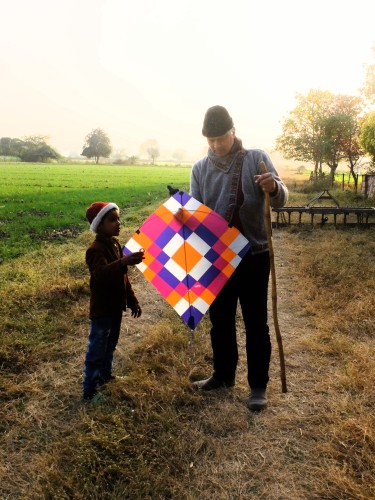 Makar Sankranti known as ‘kite flying day’ was on 14th January as always. There was reasonable breeze and our four farm boys made the most of their evenings after school flying kites. Here Vijay is passing on tips to Pintu.
Makar Sankranti known as ‘kite flying day’ was on 14th January as always. There was reasonable breeze and our four farm boys made the most of their evenings after school flying kites. Here Vijay is passing on tips to Pintu.

We knew that heavy rain was expected at the end of the month and covered up the piles of fodder in readiness. On 29th we were told that a wounded nilgai had become trapped by the end of the farm and was struggling to get up. Our neighbours dog had already attacked its hind quarter - it was tied-up. We don’t know how it received its head wounds and suspect a fight between two males. That was at 9.00pm. At 10.30pm the rain started and continued all night. We had no power for 14 hours. By the morning the nilgai was dead. There was nothing to do but dig a hole and bury it where it had died. We had had 2.25 cms. and some areas of Rajasthan had large hail stones that were cleared away with a JCB.

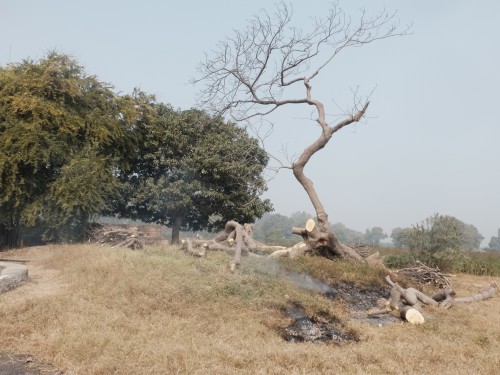 Gangs of women with head loads of dry wood could be seen heading back to Umedganj village every day. We were lucky in having our own wood neatly cut into logs with the chain saw. The Gul Mohar was cut up and a local dealer will come and remove it. The wood is soft but the trunk was solid. Termites had destroyed its roots which is why it had blown over. A tragic loss.
Gangs of women with head loads of dry wood could be seen heading back to Umedganj village every day. We were lucky in having our own wood neatly cut into logs with the chain saw. The Gul Mohar was cut up and a local dealer will come and remove it. The wood is soft but the trunk was solid. Termites had destroyed its roots which is why it had blown over. A tragic loss.

